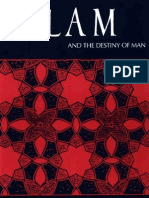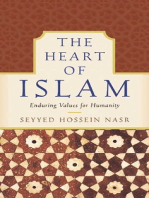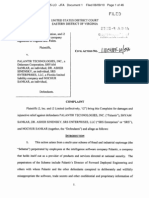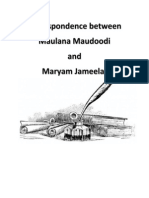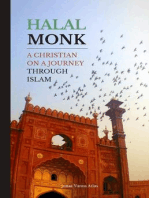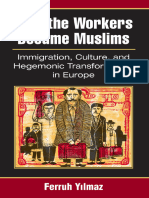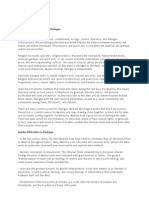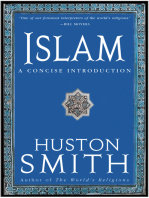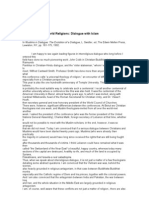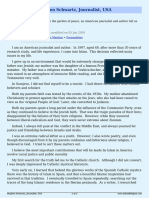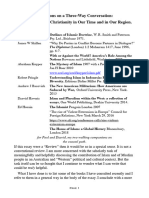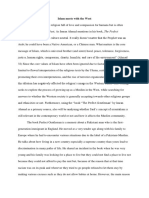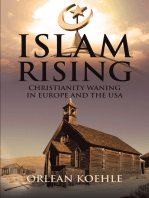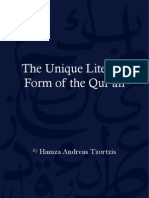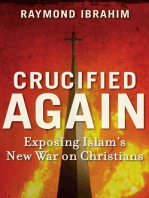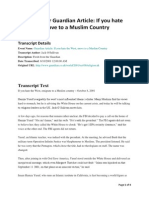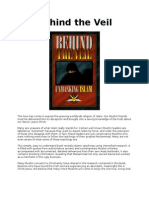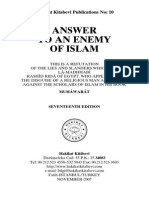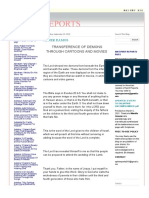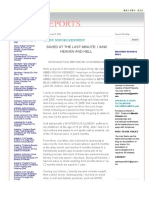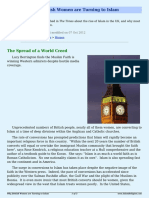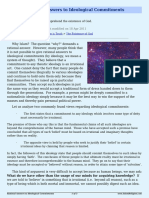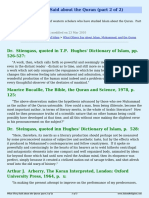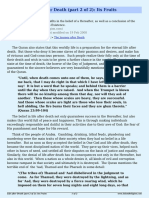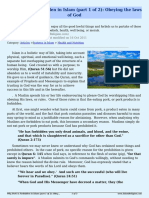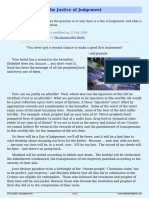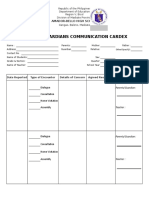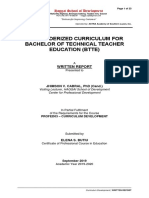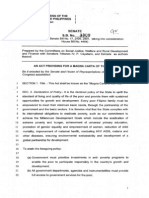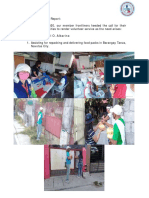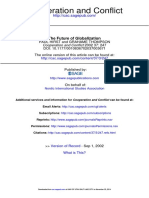Ex Ignorant IV
Ex Ignorant IV
Uploaded by
Daniel EspinosaCopyright:
Available Formats
Ex Ignorant IV
Ex Ignorant IV
Uploaded by
Daniel EspinosaOriginal Title
Copyright
Available Formats
Share this document
Did you find this document useful?
Is this content inappropriate?
Report this DocumentCopyright:
Available Formats
Ex Ignorant IV
Ex Ignorant IV
Uploaded by
Daniel EspinosaCopyright:
Available Formats
Wilfried Hofmann, German Social Scientist and Diplomat
(part 1 of 2)
Description: The story of how a German diplomat and ambassador to Algeria accepted Islam.
Part 1.
By Wilfried Hofmann
Published on 16 Jan 2006 - Last modified on 21 Dec 2008
Category: Articles >Stories of New Muslims > Personalities
Ph.D (Law) Harvard. German Social Scientist and Diplomat. Embraced
Islam in 1980.
Dr. Hofmann, who accepted Islam in 1980, was born as a Catholic in Germany in 1931.
He graduated from Union College in New York and completed his legal studies at Munich
University where he received a doctorate in jurisprudence in 1957.
He became a research assistant for the reform of federal civil procedure, and in 1960
received an LL.M. degree from Harvard Law School. He was Director of Information for
NATO in Brussels from 1983 to 1987. He was posted as German ambassador to Algeria in
1987 and then to Morocco in 1990 where he served for four years. He performed umrah
(Lesser Pilgrimage) in 1982 and Hajj (Pilgrimage) in 1992.
Several key experiences led Dr. Hofmann to Islam. The first of these began in 1961
when he was posted to Algeria as Attaché in the German Embassy and found himself in
the middle of the bloody guerilla warfare between French troops and the Algerian
National Front who had been fighting for Algerian independence for the past eight years.
There he witnessed the cruelty and massacre that the Algerian population endured.
Every day, nearly a dozen people were killed - "close range, execution style" - only for
being an Arab or for speaking for the independence. "I witnessed the patience and
resilience of the Algerian people in the face of extreme suffering, their overwhelming
discipline during Ramadan, their confidence of victory, as well as their humanity amidst
misery." He felt it was their religion that made them so, and therefore, he started
studying their religious book - the Quran. "I have never stopped reading it, to this very
day."
Islamic art was the second experience for Dr. Hofmann in his journey to Islam. From
his early life he has been fond of art and beauty and ballet dancing. All of these were
overshadowed when he came to know Islamic art, which made an intimate appeal to him.
Referring to Islamic art, he says: "Its secret seems to lie in the intimate and universal
presence of Islam as a religion in all of its artistic manifestations, calligraphy, space filling
Wilfried Hofmann, German Social Scientist and Dipl... 1 of 3 www.IslamReligion.com
arabesque ornaments, carpet patterns, mosque and housing architecture, as well as
urban planning. I am thinking of the brightness of the mosques which banishes any
mysticism, of the democratic spirit of their architectural layout."
"I am also thinking of the introspective quality of the Muslim palaces, their
anticipation of paradise in gardens full of shade, fountains, and rivulet; of the intricate
socially functional structure of old Islamic urban centers (madinahs), which fosters
community spirits and transparency of the market, tempers heat and wind, and assures
the integration of the mosque and adjacent welfare center for the poor, schools and
hostels into the market and living quarters. What I experienced is so blissfully Islamic in
so many places ... is the tangible effect which Islamic harmony, the Islamic way of life,
and the Islamic treatment of space leave on both heart and mind."
Perhaps more than all of these, what made a significant impact on his quest for the
truth, was his thorough knowledge of Christian history and doctrines. He realized that
there was a significant difference between what a faithful Christian believes and what a
professor of history teaches at the university. He was particularly troubled by the
Church's adoption of the doctrines established by St. Paul in preference to that of
historical Jesus. "He, who never met Jesus, with his extreme Christology replaced the
original and correct Judeo-Christian view of Jesus!"
He found it difficult to accept that mankind is burdened with the "original sin" and
that God had to have his own son tortured and murdered on the cross in order to save his
own creations. "I began to realize how monstrous, even blasphemous it is to imagine that
God could have been fallen short in his creation; that he could have been unable to do
anything about the disaster supposedly caused by Adam and Eve without begetting a son,
only to have him sacrificed in such a bloody fashion; that God might suffer for mankind,
His creation."
He went back to the very basic question of the existence of God. After analyzing
works of philosophers, such as Wittgenstein, Pascal, Swinburn, and Kant, he came to an
intellectual conviction of the existence of God. The next logical question he faced was
how God communicates to human beings so that they can be guided. This led him to
acknowledge the need for revelations. But what contains the truth - Judeo-Christian
scriptures or Islam?
He found the answer to this question in his third crucial experience when he came
across the following verse of the Quran:is verse opened up his eyes and provided the
answer to his dilemma. Clearly and unambiguously for him, it rejected the ideas of the
burden of "original sin" and the expectation of "intercession" by the saints. "A Muslim
lives in a world without clergy and without religious hierarchy; when he prays he does not
pray via Jesus, Mary, or other interceding saints, but directly to God - as a fully
emancipated believer - and this is a religion free of mysteries." According to Hofmann, "A
Muslim is the emancipated believer par excellence."
Wilfried Hofmann, German Social Scientist and Dipl... 2 of 3 www.IslamReligion.com
The web address of this article:
http://www.islamreligion.com/articles/124
Copyright © 2006-2015 IslamReligion.com. All rights reserved.
ajsultan
Wilfried Hofmann, German Social Scientist and Dipl... 3 of 3 www.IslamReligion.com
You might also like
- Charles Le Gai Eaton - Islam and The Destiny of ManDocument250 pagesCharles Le Gai Eaton - Islam and The Destiny of ManAdnan SaghirNo ratings yet
- The Heart of Islam: Enduring Values for HumanityFrom EverandThe Heart of Islam: Enduring Values for HumanityRating: 4.5 out of 5 stars4.5/5 (13)
- I2 v. Palantir - 080910Document46 pagesI2 v. Palantir - 080910jason cody100% (2)
- Being German, Becoming Muslim: Race, Religion, and Conversion in the New EuropeFrom EverandBeing German, Becoming Muslim: Race, Religion, and Conversion in the New EuropeRating: 5 out of 5 stars5/5 (2)
- Maryam Jameelah Why I Embraced IslamDocument13 pagesMaryam Jameelah Why I Embraced IslamIqraAlIslamNo ratings yet
- Correspondence Between Maulana Maudoodi and Maryam JameelahDocument48 pagesCorrespondence Between Maulana Maudoodi and Maryam Jameelahrehmanabbasi50% (2)
- Abu Dhabi University GEN 200 Engineering Economy Fall 2016 Term Project Due: Wed November 23, 2016Document6 pagesAbu Dhabi University GEN 200 Engineering Economy Fall 2016 Term Project Due: Wed November 23, 2016Yong JinNo ratings yet
- Continue: Sap BPC Training Material PDFDocument2 pagesContinue: Sap BPC Training Material PDFgs2s42419No ratings yet
- DR. Murad HoffmanDocument3 pagesDR. Murad HoffmandastaqNo ratings yet
- Religions: From Phobia To Understanding: Nasr Abu-ZaydDocument16 pagesReligions: From Phobia To Understanding: Nasr Abu-Zaydshahizad1982No ratings yet
- German II PDFDocument2 pagesGerman II PDFDaniel EspinosaNo ratings yet
- The Heart of Islam - Enduring Values For Humanity, by Seyyed Hossein NasrDocument357 pagesThe Heart of Islam - Enduring Values For Humanity, by Seyyed Hossein Nasrqilushuyuan100% (1)
- Said Nursi and The Meaning of LifeDocument13 pagesSaid Nursi and The Meaning of Lifesefik60No ratings yet
- Halal Monk. A Christian on a Journey through Islam.From EverandHalal Monk. A Christian on a Journey through Islam.Rating: 4 out of 5 stars4/5 (1)
- (Ferruh Yilmaz) How The Workers Became Muslims Im (B-Ok - Xyz)Document255 pages(Ferruh Yilmaz) How The Workers Became Muslims Im (B-Ok - Xyz)i c schickNo ratings yet
- André ServierDocument3 pagesAndré ServierNemanja IlicNo ratings yet
- Exploring The Roots of Islamophobia & Pakistan’ S ResponseDocument8 pagesExploring The Roots of Islamophobia & Pakistan’ S Responsewiqar aliNo ratings yet
- Muhammad Qutb - Islam The Misunderstood Religion-Kazi Pubns Inc (1980) (001-070)Document70 pagesMuhammad Qutb - Islam The Misunderstood Religion-Kazi Pubns Inc (1980) (001-070)dgmemmanuel90No ratings yet
- Islam The Misunderstood ReligionDocument143 pagesIslam The Misunderstood ReligionEbtessamNo ratings yet
- My Appreciation and Critique of Bernard Lewis 17 September 2008Document6 pagesMy Appreciation and Critique of Bernard Lewis 17 September 2008bassam.madany9541No ratings yet
- Islam and Contemporary Civilisation: Evolving Ideas, Transforming RelationsFrom EverandIslam and Contemporary Civilisation: Evolving Ideas, Transforming RelationsRating: 5 out of 5 stars5/5 (1)
- Articles: The Necessity of Interfaith DialogueDocument6 pagesArticles: The Necessity of Interfaith DialogueSiti Nor AdilahNo ratings yet
- Islam Unveiled: A Review of Robert Spencer's BookDocument5 pagesIslam Unveiled: A Review of Robert Spencer's Bookbassam.madany9541No ratings yet
- Islam, What You Need to Know in the Twenty-First Century: A Primer for PeaceFrom EverandIslam, What You Need to Know in the Twenty-First Century: A Primer for PeaceNo ratings yet
- Murad Hoffman Islam and The FuturelDocument9 pagesMurad Hoffman Islam and The Futurelapi-25980564No ratings yet
- What Is IslamDocument7 pagesWhat Is IslamPrincess MuslimaNo ratings yet
- Christianity and World ReligionsDocument17 pagesChristianity and World ReligionsDiana BlackNo ratings yet
- Steven Benson. Islam and Social Change in The Writings of Ali Shariati: His Hajj As A Mystical Handbook For RevolutionariesDocument18 pagesSteven Benson. Islam and Social Change in The Writings of Ali Shariati: His Hajj As A Mystical Handbook For RevolutionariesCarlosAmadorFonsecaNo ratings yet
- The New Islamophobia in France - Jawzi LardjaneDocument6 pagesThe New Islamophobia in France - Jawzi LardjaneBrother DzNo ratings yet
- Professor Abdelwhab Elmessiri - Philosophers of The ArabsDocument43 pagesProfessor Abdelwhab Elmessiri - Philosophers of The Arabssamirabuzaid100% (2)
- Islam Phobia John EspostisoDocument99 pagesIslam Phobia John EspostisoAinaa NadiaNo ratings yet
- Ex JournalistDocument3 pagesEx JournalistDaniel EspinosaNo ratings yet
- Three Way ConversationDocument22 pagesThree Way ConversationBruce WearneNo ratings yet
- Sejarah Islam 2Document33 pagesSejarah Islam 2nurulNo ratings yet
- Inside Islam by Annie-Marie-DelcambreDocument115 pagesInside Islam by Annie-Marie-DelcambreViva la EvolucionNo ratings yet
- Jamal U Din AfghaniDocument28 pagesJamal U Din AfghaniZulfiquarNo ratings yet
- The Monks of Tibhirine: Faith, Love, and Terror in AlgeriaFrom EverandThe Monks of Tibhirine: Faith, Love, and Terror in AlgeriaRating: 4 out of 5 stars4/5 (13)
- Islam ExplainedDocument125 pagesIslam ExplainedPddfNo ratings yet
- Sabaht&Rozina, Presentation, History of Islamic CivilizationDocument26 pagesSabaht&Rozina, Presentation, History of Islamic CivilizationSabaht KhurshidNo ratings yet
- Maryam Jameelah Why I Embraced Islam PDFDocument13 pagesMaryam Jameelah Why I Embraced Islam PDFSaad Ali50% (2)
- Handelman, The Philosopher, The Rabbi and The Rhetorician - Levinas, Manitou and Perelman, College English 2010Document19 pagesHandelman, The Philosopher, The Rabbi and The Rhetorician - Levinas, Manitou and Perelman, College English 2010mgottsegNo ratings yet
- AHA Why I Am Now A ChristianDocument4 pagesAHA Why I Am Now A ChristianHatikva Pascal0% (1)
- Correspondence Between Maryam Jameelah Maulana Maudoodi and MarcusesDocument167 pagesCorrespondence Between Maryam Jameelah Maulana Maudoodi and Marcusesmshamil100% (1)
- Reflections on the Social Thought of Allama M.T. Jafari: Rediscovering the Sociological Relevance of the Primordial School of Social TheoryFrom EverandReflections on the Social Thought of Allama M.T. Jafari: Rediscovering the Sociological Relevance of the Primordial School of Social TheoryNo ratings yet
- Muslim Interests in Palestine: Shaikh Mushir Hosain Kidwai of Gadia, Hon. Secretary of TheDocument21 pagesMuslim Interests in Palestine: Shaikh Mushir Hosain Kidwai of Gadia, Hon. Secretary of The&treeNo ratings yet
- Islam Meets With The WestDocument11 pagesIslam Meets With The WestShanzeNo ratings yet
- Intellectual and Ideological Debates On Islamophobia: A French Specificity in Europe ?Document15 pagesIntellectual and Ideological Debates On Islamophobia: A French Specificity in Europe ?linguistAiaaNo ratings yet
- Sacred Freedom: Western Liberalist Ideologies in the Light of IslamFrom EverandSacred Freedom: Western Liberalist Ideologies in the Light of IslamRating: 3 out of 5 stars3/5 (2)
- The Unique Literary Form of The QuranDocument24 pagesThe Unique Literary Form of The QuranDonmon MondonNo ratings yet
- Crucified Again: Exposing Islam's New War on ChristiansFrom EverandCrucified Again: Exposing Islam's New War on ChristiansRating: 4.5 out of 5 stars4.5/5 (4)
- Transcript For Guardian ArticleDocument4 pagesTranscript For Guardian ArticleSiswand BIn Mohd AliNo ratings yet
- Has Islam Missed Its EnlightenmentDocument10 pagesHas Islam Missed Its EnlightenmentT Anees AhmadNo ratings yet
- English: Di Balik CadarDocument177 pagesEnglish: Di Balik CadarPulp ArkNo ratings yet
- Why I Am A Secular HumanistDocument8 pagesWhy I Am A Secular HumanistluminitalupuliasaNo ratings yet
- Answer To An Enemy of Islam (English)Document128 pagesAnswer To An Enemy of Islam (English)Dar Haqq (Ahl'al-Sunnah Wa'l-Jama'ah)0% (1)
- What's Right with Islam: A New Vision for Muslims and the WestFrom EverandWhat's Right with Islam: A New Vision for Muslims and the WestRating: 2.5 out of 5 stars2.5/5 (13)
- The Myth of the Andalusian Paradise: Muslims, Christians, and Jews under Islamic Rule in Medieval SpainFrom EverandThe Myth of the Andalusian Paradise: Muslims, Christians, and Jews under Islamic Rule in Medieval SpainRating: 4 out of 5 stars4/5 (19)
- Diversity and Unity in Islamic Civilization: A Religious, Political, Cultural, and Historical AnalysisFrom EverandDiversity and Unity in Islamic Civilization: A Religious, Political, Cultural, and Historical AnalysisNo ratings yet
- Spiritreports Blogspot Com 2020 10 Abraham Iply George Yupik Eskimo of HTMLDocument36 pagesSpiritreports Blogspot Com 2020 10 Abraham Iply George Yupik Eskimo of HTMLDaniel Espinosa100% (1)
- Spiritreports Blogspot Com 2020 08 Brother Jorge 3 HTMLDocument36 pagesSpiritreports Blogspot Com 2020 08 Brother Jorge 3 HTMLDaniel EspinosaNo ratings yet
- Spiritreports Blogspot Com 2020 09 Abner Ramos HTMLDocument36 pagesSpiritreports Blogspot Com 2020 09 Abner Ramos HTMLDaniel EspinosaNo ratings yet
- Spiritreports Blogspot Com 2020 07 Abibu Ndjoki Kennedy HTMLDocument36 pagesSpiritreports Blogspot Com 2020 07 Abibu Ndjoki Kennedy HTMLDaniel EspinosaNo ratings yet
- Spiritreports Blogspot Com 2019 01 Aaron Purser HTMLDocument36 pagesSpiritreports Blogspot Com 2019 01 Aaron Purser HTMLDaniel EspinosaNo ratings yet
- Spiritreports Blogspot Com 2020 10 Adan Jose Andradez of El Salvador HTMLDocument36 pagesSpiritreports Blogspot Com 2020 10 Adan Jose Andradez of El Salvador HTMLDaniel EspinosaNo ratings yet
- Spiritreports Blogspot Com 2021 04 Nayeli Gomez of Brazil HTMLDocument36 pagesSpiritreports Blogspot Com 2021 04 Nayeli Gomez of Brazil HTMLDaniel EspinosaNo ratings yet
- Spiritreports Blogspot Com 2019 01 Moses Lushiku 21 HTMLDocument36 pagesSpiritreports Blogspot Com 2019 01 Moses Lushiku 21 HTMLDaniel Espinosa100% (1)
- Spiritreports Blogspot Com 2019 02 Isa El Buba 2 HTMLDocument36 pagesSpiritreports Blogspot Com 2019 02 Isa El Buba 2 HTMLDaniel EspinosaNo ratings yet
- Why British Women Are Turning To Islam: The Spread of A World CreedDocument3 pagesWhy British Women Are Turning To Islam: The Spread of A World CreedDaniel EspinosaNo ratings yet
- The Debauchery of American Womanhood 532 enDocument3 pagesThe Debauchery of American Womanhood 532 enDaniel EspinosaNo ratings yet
- Women Scholars in Islam (Part 2 of 2) : Fatima Muhammad Al-Fihri (D. 880 CE)Document4 pagesWomen Scholars in Islam (Part 2 of 2) : Fatima Muhammad Al-Fihri (D. 880 CE)Daniel EspinosaNo ratings yet
- Spiritreports Blogspot Com 2020 10 Zipporah Mushala 2 HTMLDocument36 pagesSpiritreports Blogspot Com 2020 10 Zipporah Mushala 2 HTMLDaniel EspinosaNo ratings yet
- What They Said About Muhammad Part 3 of 3 203 enDocument4 pagesWhat They Said About Muhammad Part 3 of 3 203 enDaniel EspinosaNo ratings yet
- Rational Answers To Ideological CommitmentsDocument3 pagesRational Answers To Ideological CommitmentsDaniel EspinosaNo ratings yet
- What Is A Mosque 2748 enDocument3 pagesWhat Is A Mosque 2748 enDaniel EspinosaNo ratings yet
- Government Influence and The Judiciary Part 2 of 2 254 enDocument2 pagesGovernment Influence and The Judiciary Part 2 of 2 254 enDaniel EspinosaNo ratings yet
- What They Said About The Quran Part 2 of 2 3363 enDocument3 pagesWhat They Said About The Quran Part 2 of 2 3363 enDaniel EspinosaNo ratings yet
- Crime and Punishment in Islam (Part 3 of 5) : 'Hudood'-Prescribed PunishmentsDocument3 pagesCrime and Punishment in Islam (Part 3 of 5) : 'Hudood'-Prescribed PunishmentsDaniel EspinosaNo ratings yet
- Forgiveness Vs Retaliation Part 1 of 2 10722 enDocument2 pagesForgiveness Vs Retaliation Part 1 of 2 10722 enDaniel EspinosaNo ratings yet
- Why Pork Is Forbidden in Islam (Part 2 of 2) : Is Pork Unclean?Document3 pagesWhy Pork Is Forbidden in Islam (Part 2 of 2) : Is Pork Unclean?Daniel EspinosaNo ratings yet
- Life After Death Part 2 of 2 274 enDocument2 pagesLife After Death Part 2 of 2 274 enDaniel EspinosaNo ratings yet
- Why Pork Is Forbidden in Islam Part 1 of 2 2513 enDocument3 pagesWhy Pork Is Forbidden in Islam Part 1 of 2 2513 enDaniel EspinosaNo ratings yet
- Sufism Part 1 of 2 1388 enDocument5 pagesSufism Part 1 of 2 1388 enDaniel EspinosaNo ratings yet
- Sufism Part 2 of 2 1389 en PDFDocument5 pagesSufism Part 2 of 2 1389 en PDFDaniel EspinosaNo ratings yet
- The Creation of An Environmental Conscience (Part 4 of 4) : God's Green EarthDocument3 pagesThe Creation of An Environmental Conscience (Part 4 of 4) : God's Green EarthDaniel EspinosaNo ratings yet
- How Did The Spread of Islam Affect The Development of Science?Document2 pagesHow Did The Spread of Islam Affect The Development of Science?Daniel EspinosaNo ratings yet
- The Justice of Judgement 569 enDocument3 pagesThe Justice of Judgement 569 enDaniel EspinosaNo ratings yet
- MM 308Document28 pagesMM 308singh.chandraNo ratings yet
- Learners Guardian Communication CardexDocument5 pagesLearners Guardian Communication CardexGladzangel LoricabvNo ratings yet
- Evidence and Trial Technique Syllabus 2020-2021Document16 pagesEvidence and Trial Technique Syllabus 2020-2021Jorrel BautistaNo ratings yet
- LOR-tanvir Mahbub SirDocument1 pageLOR-tanvir Mahbub SirChris westNo ratings yet
- Written Report in LaderrizedBTTE-ElenaSButiuDocument23 pagesWritten Report in LaderrizedBTTE-ElenaSButiuElena Salvatierra ButiuNo ratings yet
- Michele Maynard Charges Court DocketDocument3 pagesMichele Maynard Charges Court DocketErin Laviola0% (1)
- TOR ADLIGHT Coordinator Component 2Document3 pagesTOR ADLIGHT Coordinator Component 2Andre SNo ratings yet
- Arase-China Asean Non Traditional Security RelationsDocument27 pagesArase-China Asean Non Traditional Security RelationsRalph Romulus FrondozaNo ratings yet
- Property: Pre-Lecture 4.2 Professor Kathleen Morris Golden Gate University School of LawDocument6 pagesProperty: Pre-Lecture 4.2 Professor Kathleen Morris Golden Gate University School of Lawsteph.hernan6704No ratings yet
- n3 Hacking Device Chart v6Document2 pagesn3 Hacking Device Chart v6LegionXXNo ratings yet
- E - RetailingDocument30 pagesE - RetailingIndrajeet KumarNo ratings yet
- City of Fargo v. Wieland, No. 20190153 (N.D. Dec. 12, 2019)Document12 pagesCity of Fargo v. Wieland, No. 20190153 (N.D. Dec. 12, 2019)RHTNo ratings yet
- Research Presented By: Cookery Students-WisdomDocument13 pagesResearch Presented By: Cookery Students-WisdomMj BaliguatNo ratings yet
- Evaluating A Territory"s Touristic Potential PDFDocument43 pagesEvaluating A Territory"s Touristic Potential PDFDorina AntonescuNo ratings yet
- SWOT Analysis For The Ford Motor CompanyDocument5 pagesSWOT Analysis For The Ford Motor CompanyCHARALABOS LABROU100% (1)
- South Paulding High School Honors World Geography Course SyllabusDocument5 pagesSouth Paulding High School Honors World Geography Course SyllabusQuratulain MustafaNo ratings yet
- QAC-4-024 Rev 0 - Request For InspectionDocument2 pagesQAC-4-024 Rev 0 - Request For InspectionRafeeq Ur RahmanNo ratings yet
- MagnaCarta of Poor PDFDocument8 pagesMagnaCarta of Poor PDFJes AlarconNo ratings yet
- Lecture 4Document42 pagesLecture 4Mayank PathakNo ratings yet
- Community Service ReportDocument5 pagesCommunity Service Reportkmkk advocacycooperativeNo ratings yet
- Indian Highcourt Act 1911Document11 pagesIndian Highcourt Act 1911A.SinghNo ratings yet
- Maharashtra State Board of Secondary and Higher Secondary Education, PuneDocument7 pagesMaharashtra State Board of Secondary and Higher Secondary Education, PuneKashyap PatelNo ratings yet
- What Is Business Email CompromiseDocument3 pagesWhat Is Business Email Compromiseaariya goelNo ratings yet
- Future of GlobalizationDocument20 pagesFuture of Globalizationneeebbbsy89No ratings yet
- Trendline Trading Strategies GuideDocument12 pagesTrendline Trading Strategies GuideChan Ders100% (4)
- VR-20-011 National Consultant Child Protection (Women Empowerment) JKTDocument3 pagesVR-20-011 National Consultant Child Protection (Women Empowerment) JKTAnggy Wira PambudiNo ratings yet
- Grade 5 Diary Curriculum Map Term 1Document3 pagesGrade 5 Diary Curriculum Map Term 1api-283889916100% (2)
